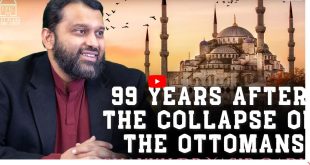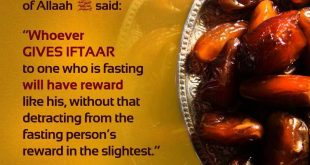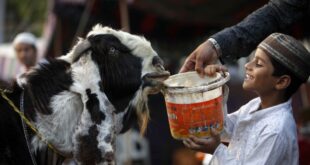 Modern medical practice has come back to the conclusion that diet is the key to good health and investment in good dietary advice will lead to a reduction in treatment costs. Emphasis on diet is a principle universal to almost all forms of traditional medicine.
Modern medical practice has come back to the conclusion that diet is the key to good health and investment in good dietary advice will lead to a reduction in treatment costs. Emphasis on diet is a principle universal to almost all forms of traditional medicine.
You can find sound advice on diet everywhere from Europe to China. The Prophet of Islam, upon whom he peace, set out the dietary principles that led to great advances in Arab and Islamic medicine.
He said: "The stomach is the well of the body and the veins drink from it. If it is healthy, the veins pass on good health, if it is sick the veins pass on poison."
The term himya is used to mean both diet and precaution. Harith, 'the doctor of the Arabs', said: "himya is the source of every cure and the stomach is the home of every illness."
To understand what is meant by himya we should recall the incident when the Prophet and his cousin, Ali, were invited to eat at the house of Umm al Mandari.
Prophet Muhammad, upon whom be peace, began to eat and then stopped and said to Ali: "You are recovering." He gave him some barley and chard saying, "This is better for you."
Himya has three functions: 1) it is used as a cute; 2) it is used to maintain good health; 3) it is used alongside cures to aid recovery.
Diet & Balance
In our previous article, we described the concept of mizaj, balance. Cures are prescribed according to the type of imbalance. Certain foods are classified as 'moist', others as 'dry'. They match their opposites.
The simplest example can he found in the Prophet's advice: "Fever is from the fire, put it out with water."
Another example would he rubbing olive oil on dry skin. One may say that these ideas are common sense and not really medical principles.
However, developing from these 'simple' examples came the system of medicine which went on to set the foundations for modern medical practice. Al-Tibb al-Nabawi influenced surgeons and physicians like Ibn Sina and Al-Hazen.
It appears that in the rapid advancement of science many forgot these basic simple 'common sense' truths. Now we find ourselves again returning to the idea of a balanced diet. Diet is normally described in terms of the three macronutrients, namely proteins, fats and carbohydrates.
The structural parts of all body cells are made of proteins. It is these which stop them from collapsing. They are also vital in the functioning of the cells. Every protein consists of a string of building blocks called amino acids.
The human body needs about 22 amino acids to make its necessary proteins. Fourteen of these can be manufactured by the body. The remainder have to be obtained through our food. The US National Academy of Sciences recommends 0.8 gms of protein per kilogram of body weight.
The concept of balance is very important. It has until recently been commonly accepted that red meat is an ideal source of high-quality protein.
 A recent British report has been interpreted as suggesting that a vegetarian diet actually optimizes health. The reason for this is that taking in large amounts of 'first grade' protein from meat inevitably leads to an increased intake of harmful animal fat.
A recent British report has been interpreted as suggesting that a vegetarian diet actually optimizes health. The reason for this is that taking in large amounts of 'first grade' protein from meat inevitably leads to an increased intake of harmful animal fat.
This was clearly understood by the Companions of the Prophet. He told them; "The lord of all foods for the people of this world and the next is meat." (narrated by Ibn Majah).
'Umar also warned them: "Be careful of meat for it has harm like the harm found in wine." Another Companion of the Prophet said: "Do not make your insides a graveyard for animals."
Balance is vital. 'Second grade' proteins found in grains and legumes are just as effective when combined with 'first grade' meat proteins. The different types of meat and their contribution to mizaj, can he found in Ibn al Qayum's Al-Tibb Al-Nabawi. It corresponds to the now widely accepted view that red meat is vital but must be balanced with fowl and vegetables.
The second of the macronutrients are fats. They are composed of fatty acids, long molecules of carbon, hydrogen and oxygen. They produce more than twice the amount of energy of proteins or carbohydrates and also carry vitamins A, D, E and K.
They are vital for growth and repair, as well as for insulating the body and maintaining a regular temperature. They cushion vital organs. There are several kinds of fat. They differ according to their degree of saturation.
Saturated fats produce high levels of blood cholesterol. Cholesterol is a complex waxy substance that is essential to the walls of body cells, the production of vitamin D, hormones, bile acids and nerve tissues. The liver produces cholesterol naturally and doesn't need any from the diet.
Therefore, any added will be excess and lead to imbalance. High cholesterol levels have been associated with high risk of heart attack. A simple way to reduce cholesterol levels would be to moderate the use of eggs and organ meats such as liver.
Carbohydrates are the third of the macronutrients. They provide the body with energy, help control the breakdown of protein and protect the body against toxins. Carbohydrates are of two types. Monosaccharides are simple single molecule sugars.
An example is glucose. Polysaccharides are more complex molecules and are broken down into two or more sugars. An example is starch. They are found in fruits, vegetables and grains. They have a high nutritive value and provide vitamins, minerals, proteins and fiber. Polysaccharides take longer to digest and are therefore more effective in keeping away hunger.
Barley has been a vital ingredient in Arab medicine dating back to the Messenger as well as an important part of his own and his followers' diet.
Importance of Digestion
A pillar in al-Tibb al-Nabawi is that illness can be related to diet and digestion. The Messenger laid special importance on position while eating as well as going to the toilet. He emphasized the importance of oral hygiene and exercise.
The 'stomach' mentioned in the saying of the Prophet quoted earlier is generally understood to refer to the whole digestive system. We are being told to keep our whole body in order. Looking carefully after our diet and digestion means looking after our whole body and ultimately our minds and inner selves.
Optimum digestion means optimum health. Digestion begins with the mouth and the teeth. Food is broken down by chewing and is moistened with saliva which stimulates the rest of the digestive process. It is then swallowed as holus. This should take a few minutes.
Problems associated with this process include the interaction of bacteria and sugar or other carbohydrates. This breaks down the protective enamel and causes tooth decay. We are told to use siwak, a simple tooth stick, when we make ritual ablution. It is said to be purifying for the mouth, pleasing to the Lord and it makes the devil angry.
In Al-Tibb Al-Nabawi, oral hygiene is not only for good health, it is a part of worship. The Messenger, upon whom he peace said, "Prayer with siwak is better than 70 prayers without it."
 The bolus passes to tile stomach via the muscular oesophagus. Reflux of stomach acid during this process leads to heartburn. This, according to Al-Tibb Al-Nabawi, can he avoided by sitting in a relaxed position while eating.
The bolus passes to tile stomach via the muscular oesophagus. Reflux of stomach acid during this process leads to heartburn. This, according to Al-Tibb Al-Nabawi, can he avoided by sitting in a relaxed position while eating.
The Messenger said: "I do not eat while leaning,' and 'I sit as a slave sits and I eat as a slave eats." He used to sit and eat on the floor with his thigh resting on his foot, with due respect to his Lord and also to those he was eating with. After the bolus has passed from tile oesophagus it enters the gallbladder.
The gallbladder stores bile made by the liver and releases it into the duodenum. Gallstones are the main prob1em associated with the gallbladder. This can he avoided by himya, correct balanced diet. A diet low in animal fats reduces the risk of gallstones. The bolus passes into the stomach which is a muscular sac that mixes acid fluid with food which then passes into the intestines.
The stomach was described by the Messenger as "the well of the body." It is very important that the well is kept clean. Dieticians are now beginning to fully realize the damage that is done to the stomach through smoking, alcohol and irritant foods.
Fasting to 'give the stomach a rest' is now a common treatment. The role of fasting in Islam is well known. The obligation to fast for one month a year benefits the Muslim's body, mind and soul. The commended regular fasting throughout the year is either three days in the middle of the month, or on Mondays and Thursdays.
There are two intestines in the digestive system. The first, called the duodenum or small intestine, is a tube that receives strong alkaline juices from the pancreas and gallbladder which break down fats and neutralize stomach acid. The most common illness related to the small intestine is duodenal ulcers.
These are commonly caused by alcohol, smoking and stress. The passage of food takes four hours in the stomach, about four and a half in the small intestine and finally about twelve hours in the large intestine. The large intestine is a tube in which food and fluid are absorbed. Food residue is formed into faeces.
The final stage of digestion, i.e. the removal of waste, is just as important as the first. The Prophet recommended we sit or squat to avoid constipation. He was very particular about keeping the private areas clean and therefore free of infection, the use of water and performing ablution afterwards. This isn't detached from worship.
The prayer that he, upon him he peace, said when he completed this final act of digestion sums up the approach of Al-Tibb Al-Nabawi. Al-Tibb is looking after one's health, physical and spiritual and, at the same time, remembering the source of all food and all health.
He used to say: "All praise belongs to God who took out from me that which harms me and left in me that which benefits me."
Source :- http://www.onislam.net
 Sri lanka Muslims Web Portal Diversity and Inclusiveness
Sri lanka Muslims Web Portal Diversity and Inclusiveness



